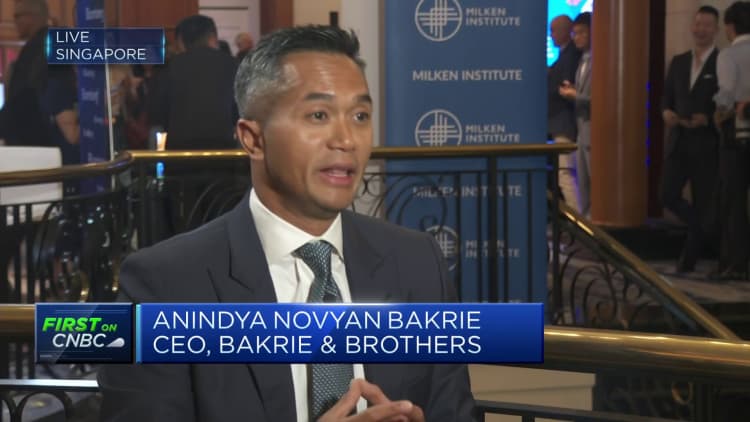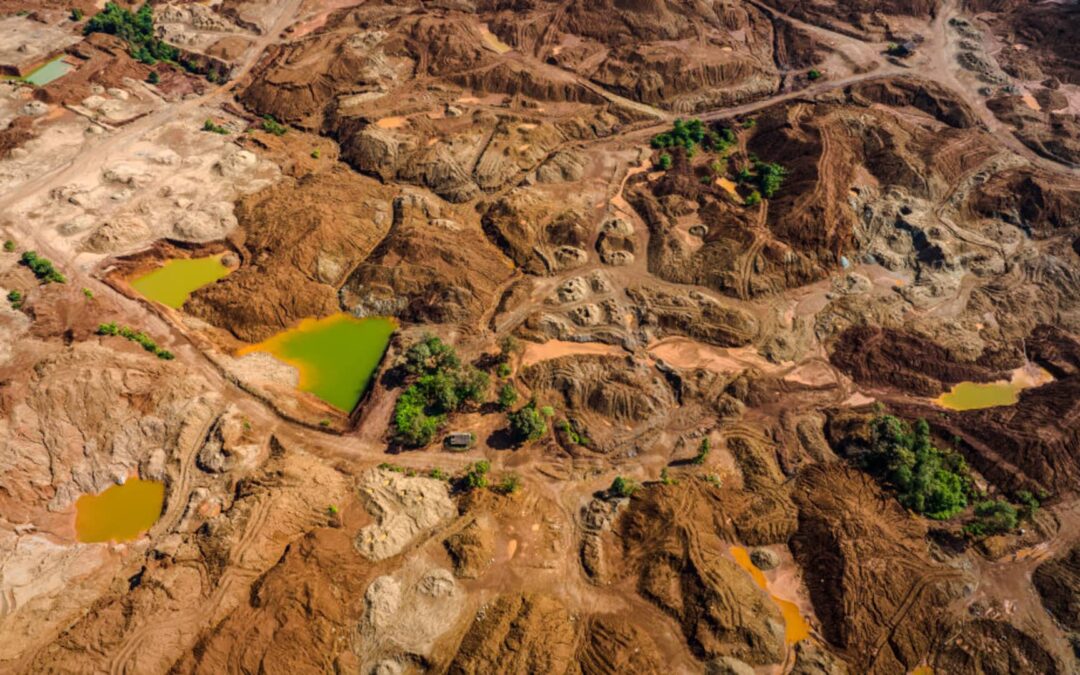NORTH KONAWE, SOUTHEAST SULAWESI, INDONESIA – AUGUST 03: In this aerial view – A view of nickel mining site on August 3, 2023 in North Konawe, Southeast Sulawesi, Indonesia. The global demand for the raw material nickel, a key component in batteries – especially those used in electric vehicles (EVs) – is growing rapidly. Estimates from the U.S. Geological Survey (USGS) showed that global nickel production grew 21% in 2022 alone. Indonesia holds the world’s largest nickel reserves and leverages those reserves to attract investment in the battery supply chain, a report by the Center for Strategic and International Studies said. The batteries needed for electric vehicles will see demand for nickel outstrip demand from other industries, such as steel production, by 2030. Indonesia alone will account for roughly half of global nickel supply growth through to 2025. The success of the country’s refining projects is a key determinant of both supply and nickel prices for the global market. As of 2020, Indonesia has 292 nickel mining permits, mostly in Sulawesi, as the island hosts most of the national nickel reserves, the same CSIS report said. Central Sulawesi Province is home to the Indonesia Morowali Industrial Park (IMIP), an integrated nickel hub for steel production, where a supply chain for battery production is planned. (Photo by Ulet Ifansasti/Getty Images)
Ulet Ifansasti | Getty Images News | Getty Images
The United States and Indonesia on Monday will discuss how to advance a potential minerals partnership aimed a stimulating trade of the electric vehicle (EV) battery metal nickel, according to three people with direct knowledge of the conversations.
Next steps that could move the countries toward formal negotiations on the partnership will be discussed when Indonesian President Joko Widodo visits the White House for a meeting with U.S. President Joe Biden on Monday, according to one of the people.
The Biden administration is still concerned about environmental, social and governance standards in Indonesia and is examining how a deal might work, the sources said. The administration also plans further consultations with U.S. lawmakers and labor groups in the coming weeks, one of the sources said.
“There’s a lot of work to do before we are able to formally announce negotiations on a critical minerals partnership,” the person said.
The White House did not respond to a request for comment.
Indonesia, which has the world’s biggest nickel ore reserves, in September asked the United States to begin discussions for a trade deal for critical minerals so that exports from the Southeast Asian country can be covered under the U.S. Inflation Reduction Act (IRA).
Most of Indonesia’s nickel is processed into crude metal but the government is keen to develop an EV supply chain to use the vast reserves of nickel, which can be processed into battery materials.
Environmental impact
The Biden administration discussions, which include U.S. Trade Representative Katherine Tai as well as the White House, focus on making sure that any potential nickel supply be produced with as little environmental impact as possible, according to one of the sources, who directly advised the administration and was not authorized to speak publicly.
“The overall momentum is promising, but (we) don’t want to minimize the fact that there is a fair amount of work to be done here,” one of the people said.
Indonesia’s nickel supplies are the world’s largest and nickel mining there has been blamed for heavy deforestation and water pollution.

Under guidelines for the U.S. law issued in March, Washington has required that a certain amount of critical minerals in EV batteries be produced or assembled in North America or a free trade partner, for EVs sold in the United States to be eligible for tax credits. Indonesia does not have a free trade agreement with the United States.
The Biden administration is also discussing ways to carve out any nickel that is extracted from Indonesia but processed in China from receiving the IRA credits, one of the sources added.
One estimate puts the global market value for the nickel industry at $33.5 billion in 2022, though the market is over-supplied.
The only U.S. nickel mine is set to close in a few years, and the country has no nickel smelter, a risk to Biden’s goal for the United States to lead in EV manufacturing.
The government last year gave nearly $115 million to Talon Metals, to partially fund a nickel processing plant in North Dakota that will supply Tesla.
Talon is seeking permits for its proposed Minnesota nickel mine, but has faced opposition from Indigenous people. Many U.S. miners have said that the Biden administration should focus more on approving domestic projects than seeking international supply.








